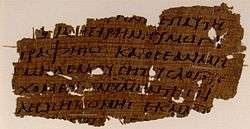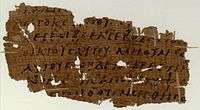Papyrus 110
 | |
| Name | P. Oxy. 4494 |
|---|---|
| Sign |
 110 110 |
| Text | Gospel of Matthew 10:13-15,25-27 |
| Date | 4th century |
| Script | Greek |
| Found | Oxyrhynchus, Egypt |
| Now at | Sackler Library |
| Cite | W. E. H. Cockle, OP LXV (1999), pp. 1-3 |
| Size | [22] x [12] cm |
| Type | Alexandrian text-type |
| Category | none |
| Note | unique readings in Matt. 10:14 |
Papyrus 110 (in the Gregory-Aland numbering), designated by  110, is a copy of the New Testament in Greek. It is a papyrus manuscripts of the Gospel of Matthew, containing verses 10:13-15 & 10:25-27 in a fragmentary condition. The manuscript has been palaeographically assigned by the INTF to the early 4th Century CE. Papyrologist Philip Comfort dates the manuscript to Middle-Late 3rd Century CE.[1]
The manuscript is currently housed in the Papyrology Rooms of the Sackler Library at Oxford University, with the shelf number P. Oxy. 4494.[2]
110, is a copy of the New Testament in Greek. It is a papyrus manuscripts of the Gospel of Matthew, containing verses 10:13-15 & 10:25-27 in a fragmentary condition. The manuscript has been palaeographically assigned by the INTF to the early 4th Century CE. Papyrologist Philip Comfort dates the manuscript to Middle-Late 3rd Century CE.[1]
The manuscript is currently housed in the Papyrology Rooms of the Sackler Library at Oxford University, with the shelf number P. Oxy. 4494.[2]
Description

The original manuscript would've been around 12 cm x 22 cm, with 40–43 lines per page. The handwriting script is representative of the Reformed Documentary or Professional (bookhand) style.[3] The Greek text of this fragment (and its parent codex) is considered to be representative of the Alexandrian text-type.[1]
Textual Variants[4]
 110 has several unique readings in Matt 10:14.
110 has several unique readings in Matt 10:14.
- εξερχομενων υμων (as you are leaving) — This genitive absolute is a unique textual variant. All other witnesses have εξερχομενοι, a nominative plural participle, normally interpreted as semitism for an imperative (Leave!).
 110 specifies that the plurality of people leaving (εξερχομαι, literally 'coming out') is explicitly 'all of you' (υμας)—the disciples whom Jesus is addressing.
110 specifies that the plurality of people leaving (εξερχομαι, literally 'coming out') is explicitly 'all of you' (υμας)—the disciples whom Jesus is addressing. - πολεως η κωμης (city or village) —
 110 agrees with Codex Sinaiticus (א), Minuscule 892 and Family 13 (f13). Other witnesses, including Codex Vaticanus (B) omit η κωμης.
110 agrees with Codex Sinaiticus (א), Minuscule 892 and Family 13 (f13). Other witnesses, including Codex Vaticanus (B) omit η κωμης. - omit εκεινης (that) —
 110 agrees with Codex Bezae (D) and Old-Latin manuscripts. The majority of witnesses include this feminine demonstrative, agreeing with two feminine nouns οικια (house) and πολις. (It would also agree with κωμη.)
110 agrees with Codex Bezae (D) and Old-Latin manuscripts. The majority of witnesses include this feminine demonstrative, agreeing with two feminine nouns οικια (house) and πολις. (It would also agree with κωμη.) - απο (from) — This is another unique variant. Codex Sinaiticus (א), Codex Ephraemi (C), Minuscule 33 and 892 have εκ. Codex Vaticanus and other manuscripts have no preposition, just the genitive case, normally interpreted as a genitive of separation.
- εκμαξατε (wipe) — This too is a unique variant, all other witnesses have εκτιναξατε (shake).[5]
 110 110 |
|
|
| και ος εαν μη δεξηται υμας μηδε ακουση τους λογους εξερχομενων υμων εξω της οικιας η της πολεως η κωμης εκμαξατε τον κονιορτον απο των ποδων υμων. | και ος εαν μη δεξηται υμας μηδε ακουση τους λογους υμων, εξερχομενοι της οικιας η της πολεως εκεινης εκτιναξατε τον κονιορτον των ποδων υμων. | και ος αν μη δεξηται υμας μηδε ακουση τους λογους υμων, εξερχομενοι εξω της οικιας η της πολεως εκεινης εκτιναξατε τον κονιορτον των ποδων υμων. |
| And if anyone does not accept you nor listen to the words, as you leave, out of the house or the city or village, wipe the dust away from your feet. | And if anyone does not accept you nor listen to your words, leave that house or city, shake the dust from your feet. | And whoever does not accept you nor listen to your words, leave, out of that house or city, shake the dust from your feet. |
10:25 (1) (word order)
- 10:25 (b)
10:25 (2)
10:25 (3)
See also
References
- 1 2 Philip W. Comfort, Encountering the Manuscripts: An Introduction to New Testament Paleography & Textual Criticism, (Nashville, Tennessee: Broadman & Holman Publishers), 2005, p. 76.
- ↑ "Liste Handschriften". Münster: Institute for New Testament Textual Research. Retrieved 27 August 2011.
- ↑ Comfort, P. W., & Barrett, D. P. (2001). The text of the earliest New Testament Greek manuscripts, pp. 656
- ↑ Taken from NA27 Edition Apparatus, and http://ntvmr.uni-muenster.de/nt-transcripts
- ↑ Elliott, J. K. (2000). "Seven Recently Published New Testament Fragments from Oxyrhynchus". Novum Testamentum 42 (3): 210. ISSN 0048-1009.
Further reading
- Cockle, Walter E. H. The Oxyrhynchus Papyri. Volume 45. London: Egypt Exploration Society, 1999. Pages 1–3.
External links
Images
- P.Oxy.LXIV 4494 from Papyrology at Oxford's "POxy: Oxyrhynchus Online"
-
 110 recto: Matt 10:13-15
110 recto: Matt 10:13-15 -
 110 verso: Matt 10:25-27
110 verso: Matt 10:25-27
Official registration
- "Continuation of the Manuscript List" Institute for New Testament Textual Research, University of Münster. Retrieved April 9, 2008
Transcription and Translation
-
 Transcription and English Literal Translation
Transcription and English Literal Translation
| ||||||
 , it, syh, co, Cyp
, it, syh, co, Cyp